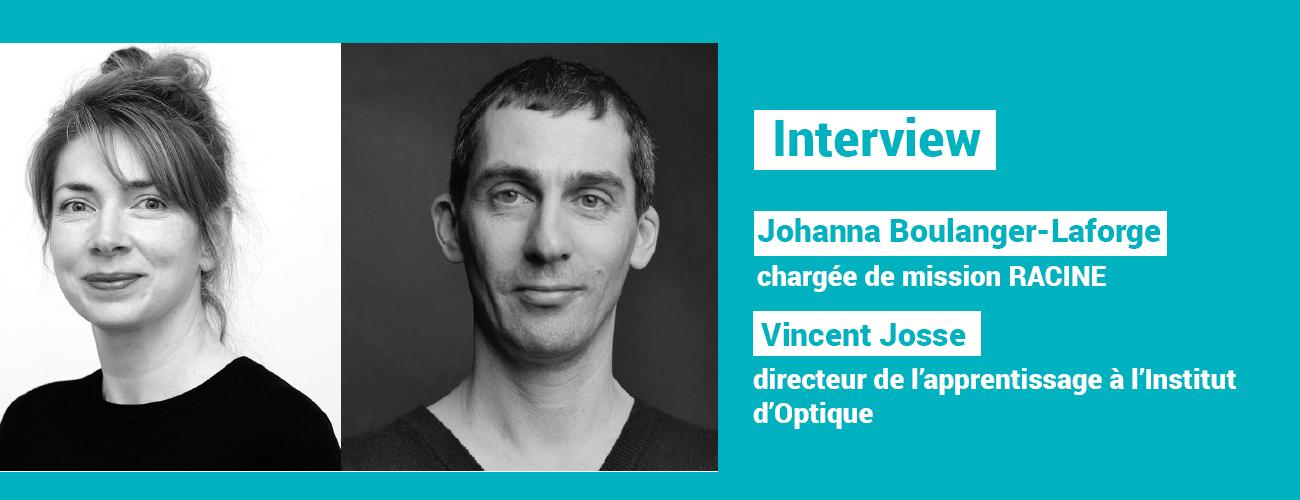
Newsletter 19 Competency-based learning: A promising educational approach
Interview with Johanna Boulanger-Laforge, Project Manager for Teaching Practices, RACINE and Vincent Josse, Apprenticeship Director at the Institut d’Optique.
Competency-based learning is a major topic on this year’s RACINE ParisTech staff training program. What are the benefits of this approach?
JBL : Competency-based learning (CBL) or competency-based education (CBE) is about equipping people to apply knowledge and competencies (hard and soft skills) acquired through learning to real-world situations. Done well, it can be a useful framework for training programs and continuous improvement. It helps engineering students make connections between their different study modules, and thus makes the learning experience more meaningful. From the point of view of staff, competency-based approaches improve the overall consistency of teaching and contextualize learning.
How has the Institut d’Optique implemented competency-based learning? What difficulties have you encountered?
VJ : We began exploring CBL in 2020. It’s a team effort. Some ten lecturers and professors are involved, two of which have been granted special leave to work on the topic. We’re tackling each level in small groups and our aim is to involve as many people from the teaching community as possible, for example by arranging themed training days and events. We also have support from partners like the ParisTech network, the Université Paris-Saclay and the Institut Villebon-Georges Charpak, with whom we work together and share ideas.
In 2020, we also created a new training semester for our trainees, based on an innovative teaching method. This created a positive dynamic and acquainted a significant number of staff with competency-based approaches in education and learning. In 2022, in collaboration with all members of our socio-professional network, we revised the competency descriptions for our programs, which among other things meant analyzing professional status and opportunities for employment or further study. This helped us establish a clear rationale for our competency-based approach, define a framework for training, and review our RNCP* sheet in preparation for the CTI** accreditation. We’re now prototyping and conducting tests on some programs.
We’ve encountered two major difficulties along the way. Firstly, we had to clarify terminology. The word “competency” has a thousand different definitions and sparked countless debates. Aligning demands from the various institutions and actual usage in the field wasn’t an easy task. We had to agree on what terms and definitions to use. The second challenge was getting faculty on board. We addressed this by providing a clear rationale and allowing staff to try out the methods for themselves. Most of the initial reservations have now been overcome.
How does RACINE plan to raise awareness of CBL among academic staff, and what training will be provided?
JBL : Our team started by doing some training themselves. Key examples included a training session with Yvan Pigeonnat (INP Grenoble) and a day of training on CBL at CY Université.
In 2023, we organized a series of three webinars with four speakers (including experts from the CTI) who are recognized for their skills and expertise by universities and graduate engineering schools alike. A total of 190 people attended. The RACINE team also took part in a workshop organized by ParisTech in which the network’s members brainstormed ideas relating to CBL, focusing on learning and assessment contexts. We then added a workshop to our 2023/2024 staff training catalogue. The workshop, titled “Competency-based learning – What are the implications for my teaching practice?”, first ran in February 2024. Four instructors were involved: Valérie Camel (AgroParisTech), Saïda Mraïhi (Arts et Métiers), Sarah Lemarchand (Télécom Paris) and Fabienne Bernard (Institut d’Optique). The workshop was very well received – so much so that a second session has already taken place this year.
Lastly, in March 2024 we ran another workshop, aimed at encouraging inter- and intra-school synergies in the application of competency-based practices. The workshop was called “Working together to manage and implement competency-based approaches in our institutions” and drew on the collective intelligence of those present: deans of studies, program directors, and leaders and members of various competency-related working groups. It too was highly praised by participants.
You’ve taken part in the events and training sessions organized by ParisTech. How have you benefited from these? In what ways have they helped your school make progress on this topic?
VJ : The three CBL webinars organized by RACINE in 2023 – especially the sessions with Benoît Escrig and Didier Erasme and the seminar organized by ParisTech – helped us reflect on our strategy. The events were open to a wide audience and were instrumental in helping attendees understand and assimilate the key concepts of CBL. We found the sessions with members of the CTI very helpful, because they provided a more people-centric, less institutional perspective.
The RACINE workshops, where we were in smaller groups, gave staff from different schools an opportunity to meet and share ideas. That created a great dynamic between the schools. We realized we were all in the same boat and more or less at the same stage. It also became clear that there’s no single answer – each school has its own way of doing things. The key is to make a start!
*RNCP: French national directory of professional certifications
**CTI: French national committee responsible for accrediting graduate engineering schools

